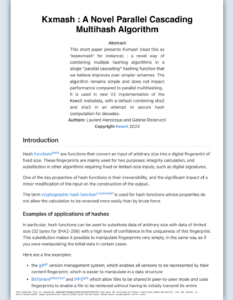🚀 KeeeX shares its new KXMash Multihash algorithm with the community!
Some documents or files need to be preserved for arbitrarily long durations. For example pay slips and diplomas, BIM (digital model of a building), or NFTs.
Fortunately, the usual algorithms for calculating cryptographic hashes are resistant to quantum computing. Nevertheless, the search for more efficient algorithms is ongoing. The future failure of a popular algorithm like SHA2 could make it possible to substitute one NFT or diploma for another in an undetectable way. How then can we protect assets for very long periods with today’s algorithms? 🤔
KeeeX tries to deliver the best in data protection to our customers, and we have historically dealt with this with “classic” combinations of algorithms requiring user control. There were drawbacks. 😒
To address the challenges of massive dematerialization and Web3, we wanted to offer a natively more robust keeexing algorithm, and enable our customers to multiply the protection of their files through simple parameterization.
🎉 KeeeX is pleased to share with the community the KXMash (pronounced keeexmash) family of algorithms, enabling hash functions to be combined according to a model that combines the effects of parallelism and cascade into a unified calculation. The process is also resistant to algorithm substitution attempts.
KXMash takes as a parameter a list of hash functions (H1,…Hn), applying them all to the entire dataset (as in parallel mode), AND adding the result of each step to the input of all subsequent steps. This parameter obeys the syntax “Hn<…<H1”. The first of the string is the last in the cascade and defines the length of the output. The “Hn<…<H1” parameter is added at the head of the data to be protected.
Let’s imagine you want:
👉 secure a file for longer durations than today’s best algorithms allow: use kxmash’s default mode, which is “SHA3-256<SHA2-256”
👉 produce a 32-byte hash, but include a 64-byte hash in the calculation, without using truncation: use “SHA3-256<SHA2-512”, for example.
👉 issue NFTs for indeterminate durations: combine three different algorithm families over a length of 512 bytes: “SHA3-512<SHA2-512<SWIFFT-512” (In its usage KeeeX only uses the algorithms available in OpenSSL, but KXMash is not limited)
KXMash is the result of an innovation being deployed in version 2 of our metadata language and tools. The pdf will tell you more.
Link to article: https://static.keeex.me/xetil-bovym….pdf


